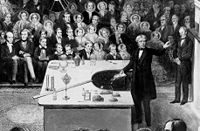 I mentioned a while ago that I was thinking of rewriting the Wikipedia page on the History of Physics from scratch. And I did. (Archived copy here, in case you’re reading this post from this blog’s archives). Now, there are a lot of complaints to be made about Wikipedia articles. In the history of science, they can be almost painfully Whiggish. In this case, I felt justified because the prior version of the History of Physics article was not only methodologically suspect, but, really, more or less unreadable, and it was clear that piecemeal amendment would not be a useful path and that no one else was going to undertake the project.
I mentioned a while ago that I was thinking of rewriting the Wikipedia page on the History of Physics from scratch. And I did. (Archived copy here, in case you’re reading this post from this blog’s archives). Now, there are a lot of complaints to be made about Wikipedia articles. In the history of science, they can be almost painfully Whiggish. In this case, I felt justified because the prior version of the History of Physics article was not only methodologically suspect, but, really, more or less unreadable, and it was clear that piecemeal amendment would not be a useful path and that no one else was going to undertake the project.
So, if an academically-trained historian is going to just swoop in and do this kind of thing, what ought to be taken into account? I feel Wikipedia is an opportunity not only to correct inadequate views, but to create a resource that can serve as both a primer on a topic, as well as a guide to various levels of literature (popular, scholarly overview, detailed scholarly work, etc…). This can be done, I think, with judicious use of documentation.
I don’t think my take on the history of physics required many references by academic standards, but the Wikipedians can be persnickety about this kind of thing. The Master of Physics Articles on Wikipedia, known as “Headbomb”, reverted my edit earlier this month, because I hadn’t yet put in new documentation and pictures. That’s fixed. I now have used the “Further Reading” section to suggest some general overviews for interested readers, while the “References” section basically serves as a “books about this particular topic” guide rather than as a “this interpretation was first suggested by” list. On this score, by the way, there’s plenty of room for alteration and improvement, so have at ye, if you like.
Content-wise, I chopped everything prior to Galileo, and put in references to the “history of classical mechanics”, “history of optics”, “history of astronomy”, and “Aristotelian physics” articles; using the argument about the collapsing of the barrier between technical and philosophical subjects in the early 17th century as justification (and cited Dear’s “Discipline and Experience” here, but if there’s a more appropriate reference…).
A lot of Wikipedia contributors tend to have a methodology that defines, say, “physics” to include information included in such-and-such criteria, and then including everything back to prehistory matching or deemed to match those criteria as a “contribution” or “precedent”. This is particularly a problem in dealing with the enthusiasts of Islamic science. I’m hazy on what distinctions Islamic scholars drew (as opposed to Scholastics) between philosophy and geometric sciences, but, it seems to me, that their work can definitely be fit in the optics/mechanics/astronomy categories, and would be inappropriate to fit into the “physics” category, the modern version of which was clearly constructed over the course of the 17th and 18th (and really, 19th) centuries. There’s also an “Islamic science” article, where someone with expertise ought to clarify what categories of knowledge were specific to that scholarly culture.
There’s also a question about what tone one should strike. I tried to keep the article scholarly but reasonably accessible (which is pretty much what the physics articles do), with references to other articles on most unexplained topics. These topics are frequently poorly written (“Aristotelian physics” basically reads “here are a bunch of crazy ideas that are wrong and here are people who introduced the modern ideas”–the page dedicated to Aristotle’s book, Physics, is a bit better). But there’s nothing to be done about this without undertaking some sort of systematic campaign. My revision is also not a completely satisfying scholarly rendering. Specifically, I feel there ought to be a section on “Natural Philosophy” to put my discussion of early experimental and theoretical work in a better intellectual context; as well as extended information in my last section on the “Physical Sciences”.
Finally, it will be interesting to check back and see if this new article serves as a scaffold for further contributions, or if it will descend back into the morass of unreadable, disconnected, decontextualized list of “contributions” that it previously was. In the meantime, if you feel like it, have a look, criticize, amend, etc, and feel free to open up any discussion on how these matters should be dealt with in the future.